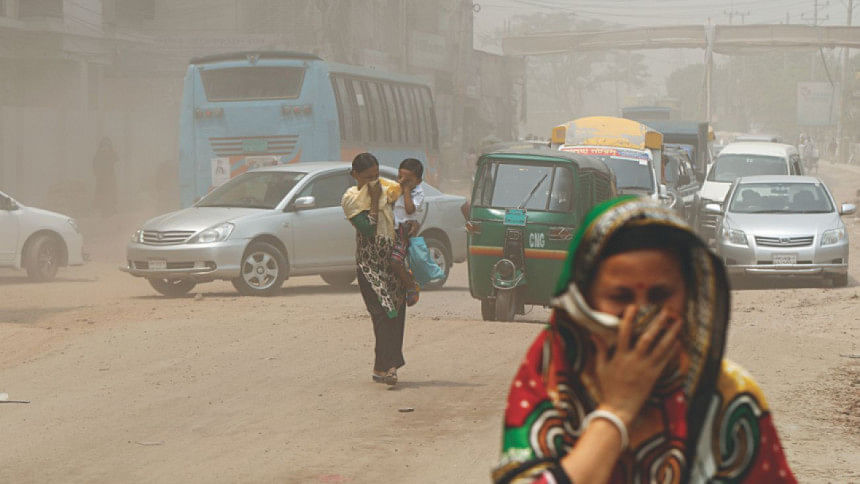Cost of air pollution: Takes 7.7 years off Dhaka residents' lives

Dhaka residents could live 7.7 years longer if air pollution subsides, found a recent global study.
Air pollution shortens the average Bangladeshi's life expectancy by 5.4 years, said the latest edition of the Energy Policy Institute at Chicago's Air Quality Life Index (AQLI), which has been released today.
At present, the average life expectancy of Bangladeshis is 72.6 years, according to the Bangladesh Bureau of Statistics. In 1998, life expectancy was cut short by 2.8 years due to air pollution, while it stood at 5.4 years in 2019.
In each of the 64 districts, the levels of particulate matter -- which are solid and liquid particles like soot, smoke, dust that remain suspended in the air -- were found to be at least three times higher than the World Health Organisation guideline.
Most of the particulate matter, also known as PM 2.5, comes from fossil fuels such as from vehicle engines and power plants, said the study by the University of Chicago institute.
Microscopic particles that are just 3 percent the diameter of a human hair are deadly when they enter the respiratory system along with the oxygen.
The average annual PM 2.5 concentrations in Bangladesh was 77.1 micrograms per cubic metre (mcg/m3) of air, which is seven times the WHO exposure recommendation, according to the World Air Quality Report 2020 that was published in March.
In 2020, Bangladesh's air quality was the worst in the world, while its capital Dhaka was the second most air polluted city, it said.
The most polluted areas of the country are the divisions of Khulna and Rajshahi, where the average resident is exposed to pollution that is more than seven times the WHO guideline -- reducing life expectancy by more than six years, according to AQLI.
The PM 2.5 concentration is high in Narayanganj, Jessore, Rajshahi, Khulna, Pabna, Dhaka and Gazipur, found the study.
Air pollution causes lots of diseases like ischemic heart disease, stroke, chronic obstructive pulmonary disease, lung cancer and acute lower respiratory infections in children, said Lelin Chowdhury, a public health expert.
"That's why it is related to life expectancy. Our life expectancy increased but how much quality improved, it should be a research topic. In a lifetime, how many days one has to be in hospitals? That should count, too."
Fossil fuel is one of the most important elements of air pollution, said Chowdhury, also the joint secretary of Poribesh Bachao Andolon, a voluntary social organisation promoting Bangladesh's environmental protection.
"The brickfields are the most dangerous, but those are decreasing. But the use of fossil fuels is increasing day by day. If we develop our public transportation only then would private transportation would reduce along with using fossil fuel," he added.
The average person is losing 2.2 years of life expectancy due to particulate pollution exceeding the WHO guideline of 10 mcg/m3, according to AQLI.
And permanently reducing air pollution according to the WHO guideline could increase the global average life expectancy from 72 to 74 years, and in total, the world's population could gain 17 billion life-years.
The impact of particulate pollution is greater than the effect of devastating communicable diseases like tuberculosis and HIV/AIDS, behavioural killers like cigarette smoking and even war.
As a comparison, first-hand cigarette smoke reduces the global average life expectancy by about 1.8 years, alcohol, unsafe water and sanitation by seven months, HIV/AIDS by four months, malaria by three months and conflict and terrorism by 18 days.
Strong clean air policies can reduce fossil fuel emissions and help reign in climate change, which can also increase life expectancies, the study said.
Researchers exemplified China as the air pollution concentrations have declined there since 2011 and improved the average life expectancy by roughly 2.6 years.

 For all latest news, follow The Daily Star's Google News channel.
For all latest news, follow The Daily Star's Google News channel. 



Comments